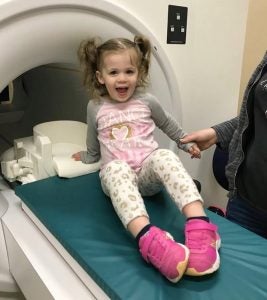Our research at a glance
Our research is aimed at investigating how memory emerges and develops. We seek to understand factors underlying the quality and durability of children's memories. We also seek to understand how neural development supports developmental changes in memory.
Our most recent research has focused on how infants and toddlers bind together different aspects of their experiences so they can recall those experiences at a later point in time. We have developed new paradigms to assess these abilities using eye-tracking (Johnson et al., 2019) and functional MRI (Prabhakar et al., 2018) methods.
For example, in one of our studies, two-year-olds are invited to our lab to play games and hear music in two distinctly different rooms. The memories for these experiences are strengthened by repeated visits to the lab. To understand the neural basis of the memory representations created in lab, fMRI data are collected during natural sleep (no sedation is used). The distinct songs the toddlers heard during their lab visits are played over the headphones as stimuli as a part of our fMRI experiment.
We are also continuing to examine the neurocognitive changes underlying memory development during childhood and adolescence, including changes associated with the transition to puberty (Lee et al., 2019; Selmeczy et al., 2019).
In addition to investigating how we create and retain memories, we are also interested in the ways that we can mentally manipulate these representations for real life applications, such as academic success (Prabhakar et al., 2016). We are interested in characterizing the development of metacognition and have focused on how children learn to assess the quality of their memories. We have gained insight on this question by assessing children's developing ability to provide confidence ratings that are well calibrated to objective memory measures.
We investigate the emergence of introspection on both memory and perceptual judgments and how it affects various behaviors (Coughlin et al., 2015). Uncertainty monitoring is an introspective ability that is crucial for many aspects of life, from school performance to making a decision about what shoes to wear. Recently we have studied how children integrate what they know with hints varying in reliability to understand the role metamemory plays in monitoring the accuracy of and necessity for information around us (Selmeczy & Ghetti, 2019).
Introspecting on the accuracy of our own memories is an ability that improves with age. Our lab is also interested in understanding the neural changes that underlie metamemory monitoring development. We have found patterns of developmental changes across childhood and adolescence that predict age-related improvements in metamemory monitoring (Fandakova et al., 2017).
Our research focus extends beyond the typical development of memory and metamemory. We conduct studies examining memory and metamemory in chronic diseases that impact functioning, such as Type 1 diabetes and Childhood Asthma. Our lab studies several forms of neurodiversity (Solomon et al., 2019; Mirandola et al. 2012) to provide comprehensive accounts of the development of memory and metamemory.







